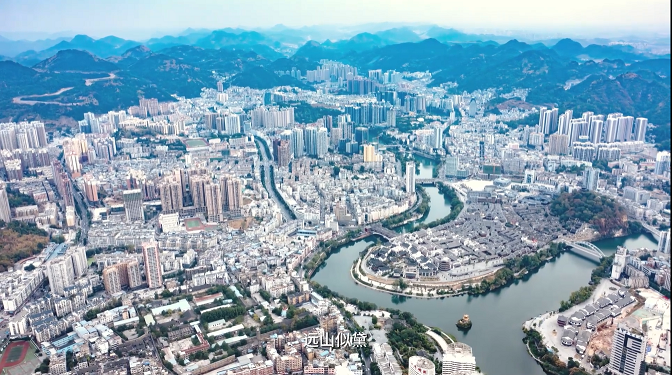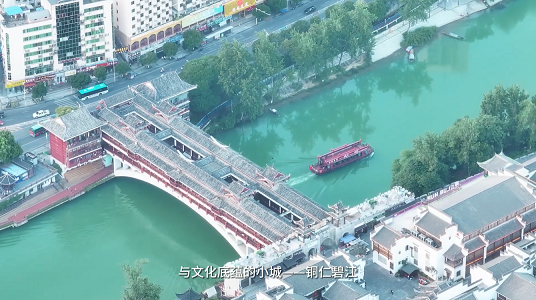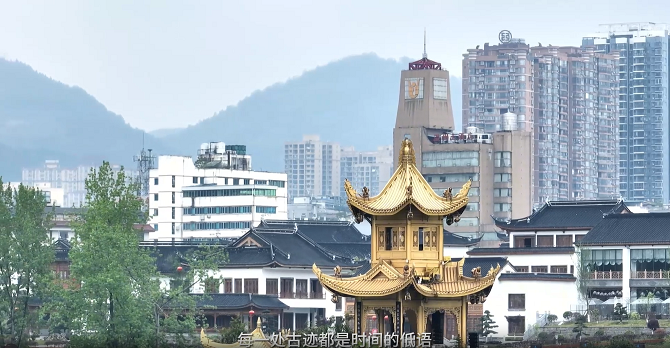- Profile Jurisdictions GOV DEPARTMENTS Cultures Travelling Educate
-
Bijang District is located in the northeastern part of Guizhou Province, at the junction of Hunan and Guizhou provinces, and serves as the central urban area of Tongren City. It is renowned as the ‘Pearl of Eastern Guizhou.’ The district covers a total land area of 1,008 square kilometres, comprising 15 towns (townships and sub-districts), 104 villages (communities), and one provincial-level high-tech zone. It has a permanent population of 442,100, with 26 ethnic groups residing within its borders, including the Han, Tujia, Dong, and Miao ethnic groups, among others. Minority ethnic groups account for 67% of the total population. It has been awarded titles such as ‘China's Traditional Dragon Boat Hometown,’ ‘National Advanced County for Ecological Civilisation,’ ‘National Advanced Collective for Comprehensive Social Management and Governance,’ ‘Top 100 Districts in China for Tourism Comprehensive Strength,’ ‘Top 100 Counties in China for Green Development,’ ‘National Advanced County for Village Cleanliness Campaign,’ ‘China's Most Beautiful Ecological Tourism Destination City,’ ‘Top 100 Districts in Western China,’ and ‘Demonstration County for Safe Guizhou Construction from 2017 to 2020.’

Bijang is the hometown of Yi Qun, with a history of over 600 years since the establishment of Tongren Prefecture during the Ming Yongle era and Tongren County during the Wanli era. In 1987, Tongren County was dissolved to establish Tongren City at the county level, and in 2011, Tongren City at the county level was dissolved to establish Bijang District. This area has produced historical figures such as Zhou Yiquan, the founder of the early Communist Party of China army, the Hunan-Hubei-West Revolutionary Base Area, and the Hunan-Hubei-West Red Army. Zhou Yiquan's former residence and the Zhou Yiquan Memorial Hall have become renowned red cultural bases in Tongren for inheriting the red gene, continuing the red bloodline, and promoting red culture; It boasts a unique traditional dragon boat culture, with dragon boat racing activities listed in the third batch of the National Intangible Cultural Heritage List. It also houses the only Nü Culture Museum in China, a living fossil of Chinese drama. The Zhongnanmen Historical and Cultural Tourism Zone, with a history of 609 years, features 103 Ming and Qing dynasty buildings, serving as a window for people to reconnect with their ‘hometown nostalgia.’ Additionally, it boasts the Tea Garden Mountain farming and reading culture, reclusive culture, and Xu family culture. The district has a total of 27 key cultural relic protection units. Its long history and rich cultural heritage have instilled cultural confidence and accumulated tremendous strength, enabling Bijiang to shine brightly in the new era.

Bijang is located in the heart of eastern Guizhou, with a superior geographical location and convenient transportation. It serves as a key node for the comprehensive development of the middle and upper reaches of the Yangtze River and economic cooperation between Guizhou and Chongqing. It borders Hunan and Hubei to the east, Sichuan and Chongqing to the north, and Yunnan and Guizhou to the west, forming an integrated ‘water, land, air, and rail’ transportation network comprising the Tongren Phoenix Airport, the Yuhuang Railway, the Hangrui Expressway, the Tongyu Intercity Railway, and the Jinjiang Waterway. The central urban area is just 20 kilometres from Tongren Phoenix Airport, with flights to over 30 major cities nationwide, including Beijing, Shanghai, and Guangzhou. The Shanghai-Kunming High-Speed Railway, Xiang-Qian Railway, Yuhuang Railway, and Tongyu Intercity Railway traverse the region, connecting east and west and radiating across the country. The Hangrui Expressway and Tongda Expressway intersect within the region, enabling seamless connectivity in all directions. It is home to the largest railway logistics park in eastern Guizhou Province, with an annual total transportation capacity of 5 million tonnes, which can be expanded to 10 million tonnes after future renovations and expansions. A Bijiang brimming with hope and dreams, radiating strength and brilliance, is rising rapidly with an even more open attitude.

Bijiang is a city of mountains and rivers, rich in natural resources and blessed with a beautiful environment. The Jinjiang River, originating from Mount Fanjing, flows through the city, with 28 rivers of various sizes. The city has distinct seasons, with rainfall and heat occurring simultaneously, resulting in a pleasant climate. It belongs to the subtropical monsoon humid climate zone, with an annual average temperature of 17.9°C. The proportion of days with good air quality is 97.3%, and the water quality compliance rate for drinking water sources serving over 1,000 people is 100%. The forest coverage rate is 70%, making it a national forest city. The region is rich in natural resources, with over 20 types of mineral resources such as manganese, vanadium, and molybdenum already identified within its borders. It is home to rare plants like redwood and Davidia involucrata, as well as endangered animals such as the white-necked long-tailed pheasant, giant salamander, mandarin duck, and red-bellied pheasant. It also features the Guizhou Bijiang National Wetland Park. The city boasts abundant tourism resources, with over 40 scenic spots with development potential, including the Zhongnanmen Historical and Cultural Tourism Zone, Jiulong Cave, and other four AAA-rated or higher tourist attractions, as well as 21 rural tourism sites. It features the most beautiful smart marathon course, and the Zhongnanmen Historical and Cultural Tourism Zone has been approved as a national-level nighttime cultural and tourism consumption cluster zone. Bijiang offers beautiful mountains, clear waters, and a pristine ecological environment, making it an ideal place for residence, work, tourism, and wellness.

Bijian is a land of opportunity, full of hope and unlimited potential. It has consistently adhered to Xi Jinping Thought on Socialism with Chinese Characteristics for a New Era as its guiding principle, resolutely implemented the decisions and plans of the central government, the provincial party committee, and the municipal party committee, closely followed the ‘Four New and Four Modernisations’ main strategy, and anchored the ‘Four Zones and One High-ground’ main positioning. With vigorous efforts and courageous progress, the entire district has presented a positive trend of stable and improving economic development, harmonious and stable social conditions, grateful and enterprising cadres and the masses, and a clean and upright political environment. The district has successfully passed the national poverty alleviation census inspection and was awarded the title of ‘Top 100 Counties in China for Poverty Prevention Efficiency’ in 2020. Bijiang High-Tech Zone has become one of the three key demonstration zones for east-west collaboration in the province, with over 1 million square metres of factory space constructed in parks-within-parks such as the Guan-Tong Industrial Park and the Small and Medium-sized Enterprise Park. A large number of well-known enterprises such as Jinrui New Materials, Weidun Chemical, Tongde Pharmaceutical, and Nongfu Spring have been established and put into operation, with a total of 228 enterprises settled in the area. The district has been designated as a national-level integrated urban-industrial development demonstration zone, a national-level innovation and entrepreneurship base, and a national-level green industrial park. It is currently striving to become a national-level high-tech zone with the support of the entire city; The built-up area of the city spans 33.5 square kilometres, with an urbanisation rate of 79.49%. Significant progress has been made in various public welfare sectors, including education, healthcare, elderly care, social security, housing, employment, and food and drug safety.
contact details
Tel:00-86-0856-5222047
Address:Room 911, 9th Floor, Main Building, Bijiang District People's Service Centre, Liangwan Village, Chuantong Street, Bijiang District, Tongren City
Working hours:Monday to Friday, 9:00-12:00, 14:30-17:30 (excluding public holidays)
